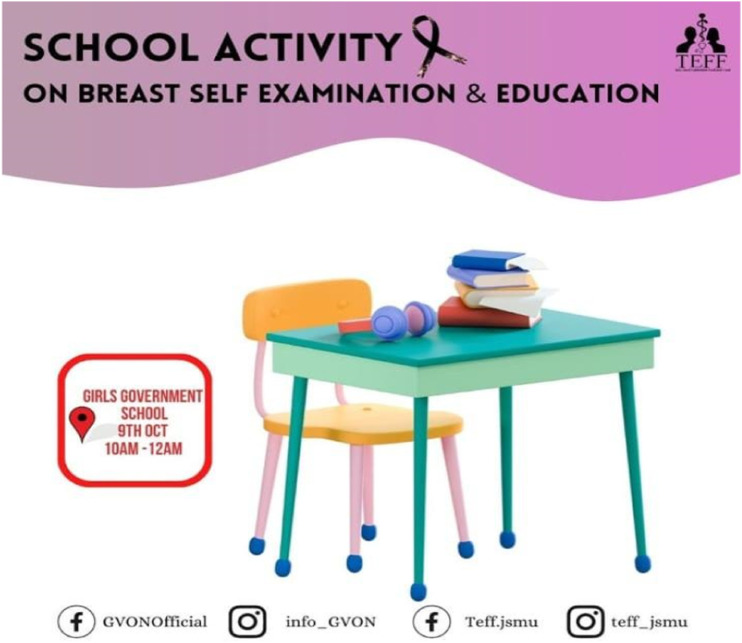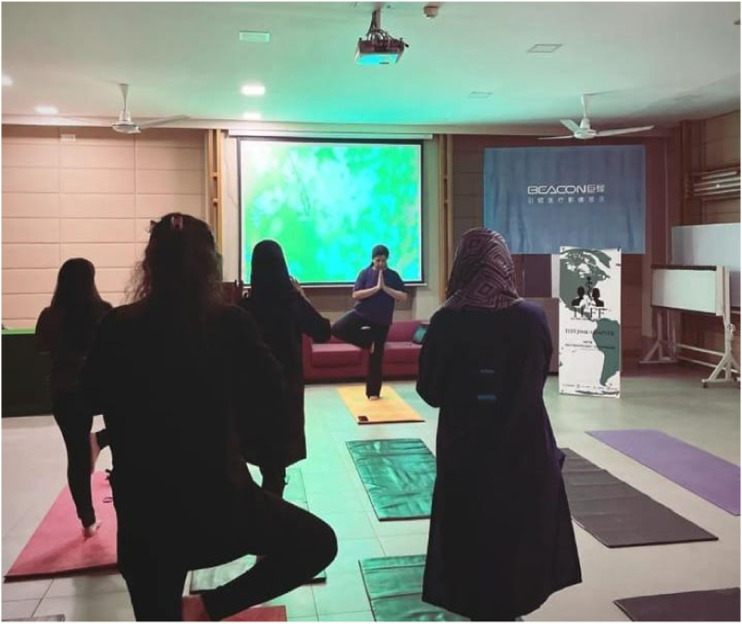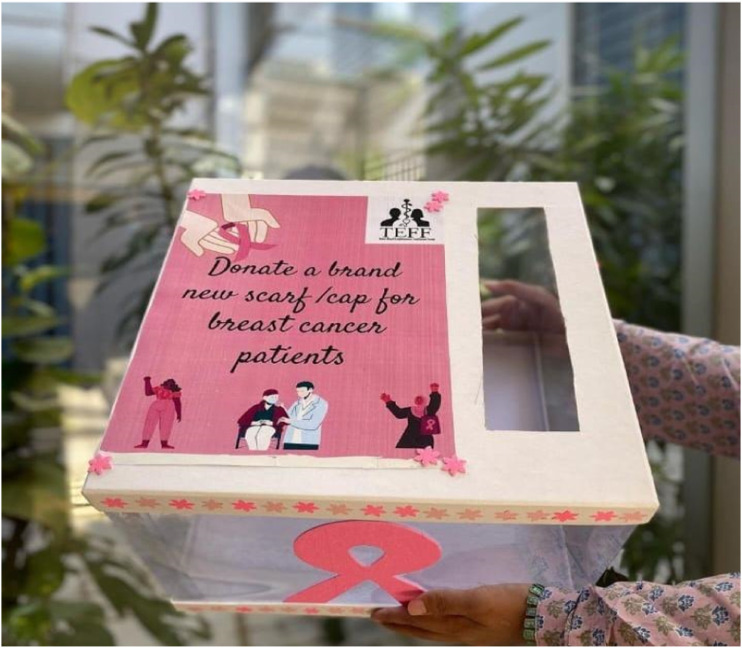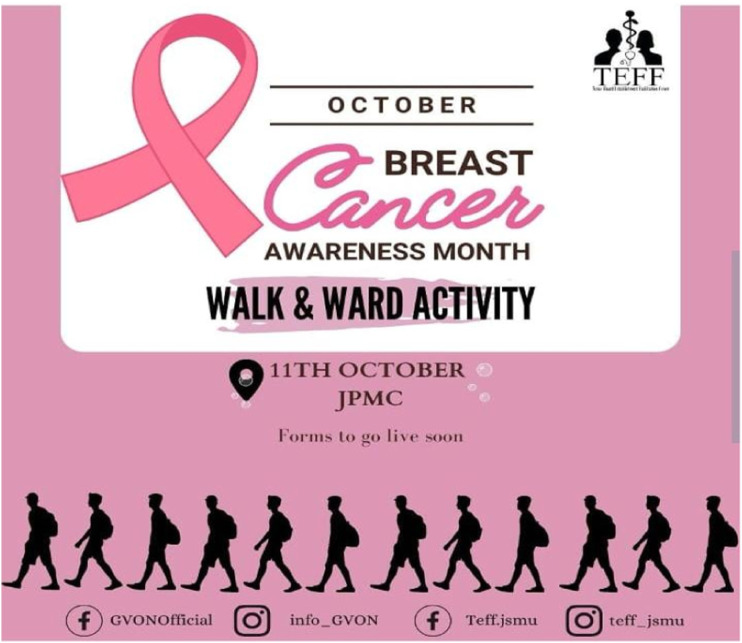Abstract
Background: Breast cancer is a widespread and fatal disease that impacts millions of individuals globally. Pakistan has seen a notable rise in both incidence and mortality rates, ranking among the highest globally alongside the Solomon Islands. The WHO Global Breast Cancer Initiative (GBCI) strives to decrease global mortality by 2.5% annually, emphasizing the need for awareness campaigns to educate women about the disease.
Purpose: Tumor boards serve as essential interdisciplinary platforms for discussing intricate cancer cases. Nevertheless, Pakistan’s health care system encounters obstacles in delivering oncology care due to limited resources. In response, the Tumor Boards Facilitation Forum (TEFF) was established to support tumor boards within the public sector.
TEFF actively promotes cancer awareness and education during Pinktober through diverse initiatives. Among these is the Self-Breast Examination workshop for students, which educates them on self-examination techniques and the significance of prompt action in identifying breast cancer symptoms. Additionally, TEFF organizes yoga activities for health care professionals, advocating for holistic well-being. Collaborating with non-profit organizations like Shine Humanity, TEFF hosts awareness camps and coordinates a scarf donation drive for cancer survivors. Furthermore, TEFF arranges breast cancer awareness walks and encourages fundraising through charity events.
Conclusion: In summary, breast cancer presents a significant challenge in Pakistan, necessitating immediate action through initiatives like GBCI and TEFF to raise awareness, enhance early detection, and provide comprehensive care. These efforts promote community engagement, foster connections among survivors, and empower individuals. By uniting our efforts, we can reduce the incidence of breast cancer, improve patient outcomes, and ensure comprehensive care for all affected individuals. This article aims to underscore the crucial role of tumor boards in Pakistan in enhancing awareness and education among women regarding breast cancer.
Keywords: incidence, breast neoplasms, global health, Pakistan, public sector, survivorship, yoga, community participation
Introduction
Breast cancer (BCa) remains a formidable challenge, affecting millions of lives worldwide. With around 2.3 million cases diagnosed each year and a death rate of 410 000 per year, BCa stands as 1 of the most prevalent cancers and the fifth leading cause of death among women worldwide.1,2 BCa is responsible for 1 out of every 4 cancer-related fatalities in Pakistani women. Pakistan has had a >300% increase in BCa incidence and a 200%-300% increase in BCa-associated mortality between 1990 and 2019. Pakistan and the Solomon Islands had the highest global rates of BCa deaths as of 2019. 3 The WHO Global Breast Cancer Initiative (GBCI), launched in 2021, aims to reduce global BCa mortality by 2.5% per year, thereby averting 2.5 million BCa deaths globally between 2020 and 2040. 4 This initiative emphasizes complete BCa care, from screening and prevention to diagnosis, treatment, and support for survivors. However, in Pakistan, very few BCa cases are detected early with the majority presenting in advanced stages emphasizing the need of awareness campaigns for educating women regarding BCa. 5 This study aims to highlight the pivotal role played by tumor boards in Pakistan to enhance awareness and education among women surrounding BCa.
TEFF as Tumor Board
Tumor boards traditionally function as interdisciplinary forums where complex cancer cases are discussed among health care professionals. However, in Pakistan, the health care system faces significant challenges, particularly in oncology care. With limited setups dedicated to oncology and a shortage of established tumor boards, the disparity between available resources and the growing burden of cancer presents a critical concern. Unlike developed countries, public sector health care facilities in Pakistan often lack the infrastructure and resources to establish robust tumor boards essential for multidisciplinary cancer care. Recognizing this gap, we established a non-profit organization, Tumor Boards Facilitation Forum (TEFF), to facilitate tumor boards in the public sector. TEFF’s objective extends beyond delivering cancer care through multidisciplinary approach; it plays a significant role in “Pinktober” which is a well-known BCa awareness campaign that has gained popularity in Pakistan, highlighting the value of early detection and treatment. Communities throughout the nation unite during October to support those impacted by BCa, generate money for services and research, and advance campaigns raising awareness and educating the public.
Pinktober Month and Activities
Pinktober’s impact goes beyond raising awareness; it also involves taking concrete steps to assist those who are coping with BCa. Women’s access to essential information and resources is ensured through the organization of outreach activities, educational seminars, and free screening camps. Additionally, Pinktober fosters a sense of solidarity and support among BCa survivors and their families, empowering them to share their stories and advocate for enhanced care and support services. The heightened visibility and collective momentum generated during Pinktober often translate into increased philanthropic support for BCa research, treatment, and support services. Studies have shown that Pinktober campaigns can increase charitable donations and fundraising initiatives by individuals and organizations. 6
Self-Breast Examination Workshop
During Pinktober, TEFF elevates its commitment to cancer awareness and education. A key initiative is the Self-Breast Examination workshop for students, empowering them with critical knowledge to share within their communities. TEFF’s efforts extend beyond the classroom, including awareness walks and visits to wards at Jinnah Postgraduate Medical Centre (JPMC), 1 of Pakistan’s largest public sector hospitals, to educate women on self-examination techniques and the importance of early detection of BCa symptoms. TEFF also reaches government schools, educating nearly 100 young girls on self-examination practices from an early age (Figure 1).
Figure 1.
School activity of breast cancer.
Yoga Activity for Health care Workers
TEFF promotes holistic well-being by conducting yoga sessions for health care workers, emphasizing the positive impact of holistic practices on overall health. 20 health care professionals attended these yoga activities, underscoring the importance of healthy activities for women’s well-being (Figure 2).
Figure 2.
Yoga activity.
Awareness Campaign and Scarf Donation Activity
TEFF collaborates with other non-profit organizations in Pakistan, such as Shine Humanity, to host awareness camps and engage with communities in places like Ghaaro, Sindh, educating around 50 women on the significance of early detection and proper care in combating BCa. During Pinktober, TEFF also coordinates a scarf donation drive for cancer survivors undergoing radiation treatment, donating approximately 30 gowns and 500 caps as a gesture of support. Shine Humanity acknowledged TEFF’s contributions by providing additional gowns for patients during their radiation sessions. Through these multifaceted efforts, TEFF serves as a beacon of hope and empowerment, championing awareness and proactive health care initiatives during Pinktober and beyond (Figure 3).
Figure 3.
Scarf donations for breast cancer.
Breast Cancer Walk
TEFF also organized an awareness walk to spread knowledge about breast cancer. A team of 30 students participated in the walk, promoting Pinktober’s message and inspiring others to engage in fundraising efforts, whether by participating in charity events, organizing fundraisers, or making donations to BCa charities (Figure 4).
Figure 4.
Breast cancer walk.
Impact and Outcomes of TEFF's Pinktober Initiatives
All of the above mentioned activities have enabled TEFF to connect with more people and make a meaningful impact in advancing breast cancer awareness, early detection, and patient support. Through multiple workshops, media campaigns, and medical camps in underprivileged areas and Government schools, TEFF has inspired greater involvement from the medical community, with around 80 students enthusiastically participating in a mock tumor board activity to better understand its practical applications. 7 On-the-ground efforts have also helped TEFF earn the trust and collaboration of larger NGOs like shine humanity, leading to a 3-year agreement to provide caps and gowns for breast cancer patients. These growing partnerships and increased support underscore TEFF’s commitment to creating a supportive network for those affected by breast cancer and driving lasting change in the community.
Conclusion
In conclusion, BCa poses a significant global challenge, particularly in Pakistan, where incidence rates are rapidly increasing. The WHO’s Global Breast Cancer Initiative (GBCI) aims to tackle this issue by prioritizing early detection and comprehensive care. Pinktober and organizations like TEFF are crucial in raising awareness, supporting, and advocating for improved cancer care services. Their efforts encourage community involvement, strengthen the bonds between survivors, and empower individuals. By working together, we can lower the incidence of BCa, enhance patient outcomes, and ensure comprehensive care for all those impacted.
Acknowledgments
We would like to extend our gratitude to our supervisors and the healthcare professionals and medical students who are volunteering for TEFF. Their support, expertise, and dedication have been invaluable to this study.
Footnotes
Author Contributions: Dr. Fatima Shaukat: Provided supervision, contributed to the conception of the article, and performed proofreading. Kanza Farhan: Responsible for writing the article. Nayab Shahid: Contributed to writing, editing, and managed the submission process. Zainab Anwar: Contributed to the conception of the draft. Marrium Sultan Dar: Contributed to the conception and reviewed the article.
The author(s) declared no potential conflicts of interest with respect to the research, authorship, and/or publication of this article.
Funding: The author(s) received no financial support for the research, authorship, and/or publication of this article.
Data Availability Statement
All relevant data are included within the manuscript and properly cited in the reference section.
References
- 1.Lei S, Zheng R, Zhang S, et al. Global patterns of breast cancer incidence and mortality: a population-based cancer registry data analysis from 2000 to 2020. Cancer Commun. 2021;41(11):1183-1194. doi: 10.1002/cac2.12207 [DOI] [PMC free article] [PubMed] [Google Scholar]
- 2.WHO . World fact sheets cancers. Globocan. 2020;419:1-2. Available at: https://gco.iarc.fr/today/data/factsheets/populations/900-world-fact-sheets.pdf [Google Scholar]
- 3.Xu Y, Gong M, Wang Y, Yang Y, Liu S, Zeng Q. Global trends and forecasts of breast cancer incidence and deaths. Sci Data. 2023;10(1):334. doi: 10.1038/s41597-023-02253-5 [DOI] [PMC free article] [PubMed] [Google Scholar]
- 4.https://www.who.int/news-room/fact-sheets/detail/breast-cancer#:∼:text=WHO_esponse,globally_between_2020_and_2040
- 5.Khan NH, Duan SF, Wu DD, Ji XY. Better reporting and awareness campaigns needed for breast cancer in Pakistani women. Cancer Manag Res. 2021;13:2125-2129. doi: 10.2147/CMAR.S270671 [DOI] [PMC free article] [PubMed] [Google Scholar]
- 6.Jacobsen GD, Jacobsen KH. Health awareness campaigns and diagnosis rates: evidence from national breast cancer awareness month. J Health Econ. 2011;30(1):55-61. doi: 10.1016/j.jhealeco.2010.11.005 [DOI] [PubMed] [Google Scholar]
- 7.Shaukat F., Siddiqui T., Ahmed Y., Khan M., Fahim M., Noor A., Khan A.M.H., Abbasi A.N., 2024. Assessing the effectiveness of tumour board education among medical students: a pre-post-test analysis. [DOI] [PMC free article] [PubMed]
Associated Data
This section collects any data citations, data availability statements, or supplementary materials included in this article.
Data Availability Statement
All relevant data are included within the manuscript and properly cited in the reference section.






